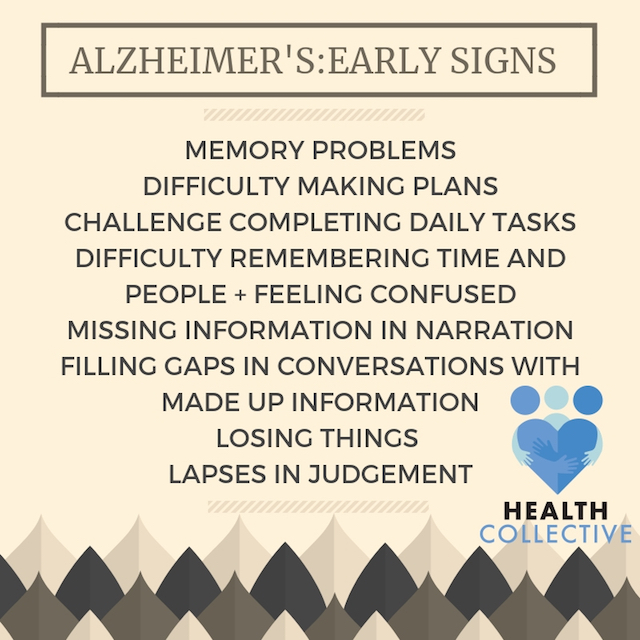Understanding Dementia
A common complaint from the elderly is forgetfulness — whether it’s something they’ve misplaced, or a thing they’ve forgotten. Usually no one bothers to take it seriously, putting the ‘condition’ if we can call it that, down to old age. So when do you need to be concerned?
Well, awareness is key.
It’s often only at later stages of dementia (a set of symptoms that includes Alzheimer’s, Parkinson’s and other diseases), that family members realise something more serious is going on, for example when the person is forgetting your name or what they just ate, when someone is wandering off and forgetting where they live, for example, or forgetting the words for every day objects.

ALSO READ: ALZHEIMER’S: THE NEED FOR COMPASSION AND CARE

What You Need to Know:
Anastasia Dedhia, the CEO and founder of Mind Mantra, tells The Health Collective that since dementia manifests differently for different people, each person would need a customised care plan. She shares some common risks to watch out for, and some tips for care-givers.
- Risk of falling: There are many people with dementia who fall because they have forgotten which side of the bed to get off from, where the table is, or if there’s a carpet underneath. Tip for care-givers: Keep the environment clean and clutter-free
- Risk of wandering off: A lot of elderly people wander away. Tip for care-givers: When the elderly member of your family goes out for a walk, or a stroll, even if it is within your own building society, make sure you put a piece of paper with their family’s contact details in their pocket
- Risk of accidents while driving a vehicle: Driving is a big no no. Driving is an extremely complicated process and one cannot predict how erratic the brain is of someone suffering from dementia
- Risk of Fraud, abuse and exploitation: Any kind of documentation requiring signatures, financial transactions or more, should be done in the presence of a trusted family member
- Risk of forgetting medication: It’ quite common for the elderly to forget to take their medication. Tip for care-givers: Make sure that there is a regular check to ensure the medicines are taken on time
Dedhia points out that it is important to know that caregivers also go through a lot of difficulty during this time. “There is a ton of cognitive fatigue that comes with being a caregiver. Answering questions all the time, repeating answers, and instructions can get tiring, and put them (care-givers) under a lot of stress,” she tells The Health Collective.
She recommends therapy for care-givers and psycho-education to understand this illness. “Quite often the caregiver blames themselves for not spending enough time, or not doing enough for the patient, but they have to learn to know the difference between quality time and quantity time,” she points out. “They will be more helpful if they spend just a few quality hours with the elderly rather than spend more…hours and get irritated by the patient’s behaviour.”
ALSO READ: DEMENTIA: FIVE THINGS NOT TO SAY
More Tips for care-givers:
- Repetition is often helpful: Care-givers need to be extremely patient with the patients and get used to repeating themselves when trying to convey information
- Avoid open-ended questions: When you ask a question you should give them two options to choose from. For example: Dad when is my birthday, is it 21st March, or 21st April?
- Make sure the room and environment is clutter-free: It should be clean. Because sometimes they also forget the way to go to the bathroom, or where a table or a stool is put, they bump into objects, and can trip over, so best to keep the environment clutter-free
- Spend quality time, not quantity time: It’s easy to get irritable and overwhelmed, whether you are a care-giver or a visiting relative. The symptom of forgetfulness can be particularly frustrating. But keep in mind that the patient can sense the irritability. It might be better to spend just a few hours with them, and be mindful of how to keep the conversation going. Read out the news, tell them about what’s going on, festivals, other events, to keep them posted on the environment, time and season
She points out that it is difficult for the elderly to recognise people and faces, referencing a case where a patient thought his daughter was his mother. Her suggestion? Family members can make a family chart, with photos of children, grand-children etc and note the names and relations to the elderly patient on the chart.
As much as patients suffering from dementia need help and support, their care-givers are also vulnerable and need to practise self-care as well.
– With inputs from Sukanya Sharma
Disclaimer: Material on The Health Collective cannot substitute for expert advice from a trained professional. If you would like to share your story, do write to us here or tweet us @healthcollectif
Feature Image by rawpixel.com


